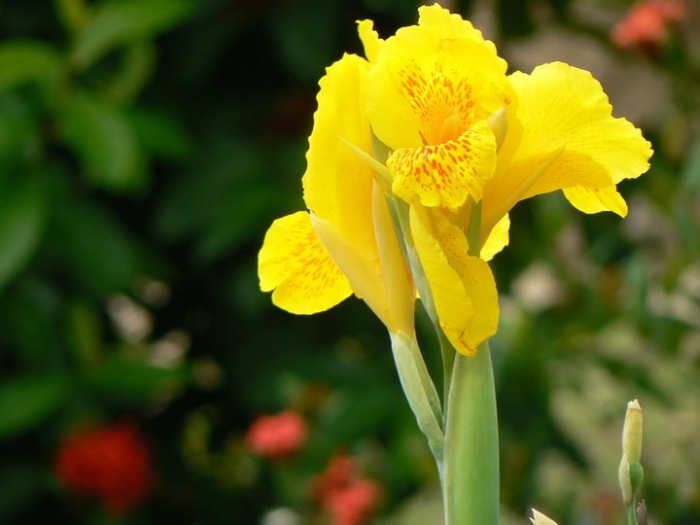Bandanna Of The Everglades
(Canna flaccida)
Bandanna Of The Everglades (Canna flaccida)
/
/

Jessivigia
CC BY-SA 4.0
Image By:
Jessivigia
Recorded By:
Copyright:
CC BY-SA 4.0
Copyright Notice:
Photo by: Jessivigia | License Type: CC BY-SA 4.0 | License URL: https://creativecommons.org/licenses/by-sa/4.0 | Uploader: Jessivigia | Publisher: Wikimedia Commons | Title: Canna_flaccida_-_caño_el_tigre_municipio_zea_septiembre_2015.jpg | Notes: Transferred from Flickr via #flickr2commons |










































Estimated Native Range
Summary
Canna flaccida, commonly known as Bandanna Of The Everglades, is a perennial herb native to shallow wetlands, marshes, and the edges of ponds and streams in the southeastern United States. It typically grows to 1.5 meters tall, with narrow, blue-green leaves that provide a striking backdrop to its large, showy, canary yellow flowers. These flowers are lightly perfumed and feature a distinctive wavy lip. They bloom in clusters atop long stalks, uniquely emerging in the evening and withering by the next day’s heat. Canna flaccida is the only species in its genus with this flowering behavior. It flowers from August to October in northern latitudes, with seeds ripening in October. The flowers are hermaphroditic, containing both male and female organs.
Bandanna Of The Everglades is valued for its ornamental flowers and is often used in water gardens and as a marginal aquatic plant. It thrives in full sun and requires high amounts of water, preferring to grow in wet, boggy soils. While it is hardy to USDA zone 10, it is frost tender and may require protection or lifting in colder climates. This species is not typically associated with significant diseases or pests, but it can be sensitive to frost damage.CC BY-SA 4.0
Bandanna Of The Everglades is valued for its ornamental flowers and is often used in water gardens and as a marginal aquatic plant. It thrives in full sun and requires high amounts of water, preferring to grow in wet, boggy soils. While it is hardy to USDA zone 10, it is frost tender and may require protection or lifting in colder climates. This species is not typically associated with significant diseases or pests, but it can be sensitive to frost damage.CC BY-SA 4.0
Plant Description
- Plant Type: Herb
- Height: 2-5 feet
- Width: 1-1.5 feet
- Growth Rate: Moderate
- Flower Color: Yellow
- Flowering Season: Summer
- Leaf Retention: Deciduous
Growth Requirements
- Sun: Full Sun
- Water: High
- Drainage: Medium, Wet
Common Uses
Bee Garden, Bird Garden, Butterfly Garden, Deer Resistant, Hummingbird Garden, Showy Flowers, Water Garden
Natural Habitat
Shallow wetlands, marshes, and the edges of ponds and streams in the southeastern United States
Other Names
Common Names: Bandana-Of-The-Everglades, Golden Canna, Balisier, Guldkanna
Scientific Names: , Canna flaccida, Canna flava, Canna reevesii, Canna glauca subsp. flaccida, Canna glauca subsp. flava, Canna glauca var. flaccida, Canna glauca var. flava, Eurystylus flaccidus, Eurystylus reevesii,
GBIF Accepted Name: Canna flaccida Salisb.